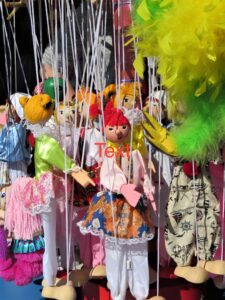 Q: What’s brown and sticky? A: A stick!
Q: What’s brown and sticky? A: A stick!
I’m a terrible joke-teller. I never remember the punch lines and I have a poor sense of timing. I’m the friend you patiently wait for as I try out three or four endings before giving up on the joke altogether. But 20 years ago, my friend, Sarah, told me the stick joke and I wish I could give her a dollar for every time I’ve told it. It’s one of two jokes I can remember, the other also being from Sarah about elephants that I probably shouldn’t tell here.
I got serious about jokes around the time of the 2016 election. I hated to see family members and friends fight via social media. When I noticed people in my circle “unfriending” one another, I couldn’t think of what to do. Traditional avenues of discourse seemed to close overnight. Perhaps a common ground was something that would make people laugh no matter their political persuasion. I scoured the internet and found kid jokes. It seemed like a silly solution to an unsolvable problem, but jokes have the power to humanize and to remind us why we like each other in the first place.
Jokes seem to fall into several categories, but philosophers tend to classify jokes two ways. There are the jokes that make us feel intelligent, such as word play and puns. There are also jokes that cast the teller as fool, which we may think of as classic “dad” jokes. One must be willing to laugh at themselves to get a true laugh (or at least a pointed groan) for this type of joke. The writer Jason Zinoman posits that dad jokes remain a certain emotional age and only become embarrassing when children continue to mature but the jokes don’t. I am a teller of dad jokes; my sense of humor has not developed much since I was 8.
Q: What kind of shorts do clouds wear? A: Thunderwear!
I have shared jokes daily since our stay-at-home orders took effect in mid-March. I watched helplessly as some friends were laid off and others tried to homeschool their children while also maintaining full-time jobs. Many of us added teleconferencing to the mix as well as an overwhelming sense of anxiety. Days that once seemed predictable in their routines now felt haphazard. I woke up one morning trying to shake myself out of my own depression and wondered what I could do for others. Nothing, really, except find a good joke to share and maybe lighten someone else’s mental load for a moment.
Most of my friends on Facebook ignore these jokes. Others laugh and participate by either commenting on the joke or on me as the sharer. An acquaintance sends a personal note to ask how I can make jokes at a time like this. She is upset as we all are. However, I believe many of us try to find humor in scary situations as a way of coping. For example, the first thing my father and I discussed when quarantine began was the quality of our recent toilet paper purchases and how COVID-19 was all a massive plot by Charmin. Judging by internet memes, we are not the only ones who have made this joke as the very real panic set in when customary staples began disappearing from grocery store shelves.
Q: Why did the crow sit on a telephone pole? A: He wanted to make a long-distance caw.
As more and more people divulge that they actually look forward to these jokes, I have realized that being able to share laughter with others has given me a sense of purpose. I confess that some mornings it is the task of finding a joke to post on Facebook that has roused me from bed when no other positive thoughts or amount of self-talk has. What has been especially joyful is a series of comments from my friend’s 3-year-old son, Jett. Every day, my friend shares my joke with him and posts his responses. To the joke about thieving “crookadiles,” Jett replies that it’s “not nice to steal.” To a joke about fish attending school, he reminds us, “Fish aren’t very smart.” And he improved a seahorse joke by spinning a tale about special unicorns of the sea.
I’ve been told by my friends who are fathers that I’m only getting away with telling dad jokes because I’m being ironic and I’m not embarrassing any kids. This is not true. Daily joke-telling became part of my routine as a teacher. I would embarrass about 70 students four days a week, playing the fool and laughing at my own jokes. As a composition teacher, I use puns and wordplay to have fun with language. When the joke bombs, there are 140 eyes that avoid my two, blink-blinking toward the door waiting for class to end. When it lands, I get some groans—students are too cool to laugh, after all. Although I was advised in a professional development course not to tell jokes, I’ve found jokes help students relax and prepare themselves for learning.
I’ve decided to become a math teacher but I’m only going to teach subtraction. I just want to make a difference!
I posted this joke the day after I found out that I lost my teaching job due to budget cuts and anticipated low enrollments. Even as I write “lost,” my thoughts turn immediately to, Where did I put it, ha ha. I don’t know what the future holds, but then again, none of us do. A friend reminds me that when one door closes, another opens. In my head, I think, Yes, that’s how doors usually work. In the meantime, I’ll be ba dum tss-ing my way to something resembling normalcy until life is normal once again. And asking you if you’ve heard any good jokes lately.

